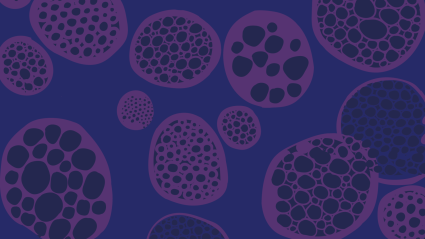
CAMK2-Related Neurodevelopmental Disorders
Overview
CAMK2-related neurodevelopmental disorders are a newly recognized family of conditions associated with mutations in the CAMK2 genes. These genes encode calcium/calmodulin-dependent protein kinase II (CAMK2), which plays a key role in mediating calcium signaling in the brain. Mutations in the CAMK2 genes can disrupt synaptic plasticity, learning, and memory, leading to developmental and motor delays, seizures, behavioral abnormalities, and neuropsychiatric effects. The symptoms and severity of CAMK2 disorders can vary widely, depending on which CAMK2 gene is mutated and the specific type of mutation.
While approximately 300 individuals have been diagnosed with a CAMK2-related neurodevelopmental disorder to date, scientists and clinicians expect that many more people with neurodevelopmental disorders will discover that their condition is CAMK2-related, thanks to newly available genetic tests that comprehensively identify gene mutations. Currently, there are no Food and Drug Administration-approved therapies for these disorders; treatment approaches focus on symptom management, which fails to address the disease’s root cause. As more individuals with CAMK2 mutations are identified over time, and as awareness of CAMK2-related neurodevelopmental disorders spreads, a better understanding of all possible symptoms and how specific mutations lead to various symptoms and severity is expected to emerge. This knowledge will drive a much-needed effort to understand the biology of these disorders and how to treat them effectively.
Science Philanthropy Accelerator for Research and Collaboration (SPARC) will conduct a comprehensive research and clinical practice review exploring the symptoms, biology, and clinical care of CAMK2 disorders. The landscaping effort will result in a public report that distributes knowledge about these complex and rare disorders and identifies targeted opportunities for philanthropy to make an outsized impact on improving the lives of patients and their families.
CAMK2-Related Neurodevelopmental Disorders
Related Articles
-

Uterine Leiomyosarcoma: A Giving Smarter Guide
This Giving Smarter Guide describes the current state of research, clinical practice, and treatment approaches for uterine leiomyosarcoma (uLMS) and identifies critical areas where philanthropy can significantly advance scientific knowledge...Read Report -

Request for Proposals: Ann Theodore Foundation Learning Opportunities in Medicine and Sarcoidosis
The ATF-LOMAS is now accepting applications for awards of up to $100,000 per year for two-year research projects led by early career investigators who seek to increase the foundational understanding of sarcoidosis through projects focused...Read Article -

The Value of Collaboration in Rare Disease Research
Philanthropy, Collaboration, and Advocacy Overcome Roadblocks at the Intersection of Cancer and Rare Disease Hearing the words “You have cancer” is life-changing—even more so when your cancer is one that doctors very rarely see. This is...Read ArticleImage
Caitlyn Barrett, PhD
Director, Science Philanthropy Accelerator for Research and Collaboration (SPARC) team, Milken Institute Strategic PhilanthropyCaitlyn Barrett, PhD, is a director on the Science Philanthropy Accelerator for Research and Collaboration (SPARC) team at Milken Institute Strategic Philanthropy. Her scientific expertise in cancer biology and neurodegeneration in addition to her experience in grant and program management, stakeholder engagement, and program analysis are brought to bear as she partners with philanthropists to maximize their impact on the biomedical ecosystem. -

The Power of Community for Rare Disease Research
Collaboration, communication, and community are the foundation for meaningful progress in any field. For individuals living with a rare disease, it means even more: A supportive community can alleviate feelings of isolation and foster...Read ArticleImage
Quinton Banks, PhD
Associate Director, Science Philanthropy Accelerator for Research and Collaboration (SPARC) team, Milken Institute Strategic PhilanthropyQuinton Banks,PhD, is an associate director on the Science Philanthropy Accelerator for Research and Collaboration (SPARC) team at Milken Institute Strategic Philanthropy. His extensive scientific background includes research into chronic pain, taste perception, and muscle physiology. -

Artificial Intelligence, Precision Medicine, and Neurodegenerative Disease: A Giving Smarter Guide
Neurodegenerative diseases (ND), including Alzheimer’s disease, Parkinson’s disease, frontotemporal dementia, and others, affect over 50 million people worldwide. The World Health Organization estimates that by the year 2040, NDs will be...Read Report -

Strategic Philanthropy Can Bridge a Rare Disease that Causes Blindness with Common Neurodegenerative Disorders
For the 200 million Americans who wear eyeglasses, blurry vision is often the symptom that leads to an eye exam and a prescription for corrective lenses. However, for about 100 Americans each year, blurry vision is an early symptom of a...Read ArticleImage
Nadia Penrod, PhD
Associate Director, Science Philanthropy Accelerator for Research and Collaboration (SPARC) team, Milken Institute Strategic PhilanthropyNadia Penrod,PhD, is an associate director on the Science Philanthropy Accelerator for Research and Collaboration (SPARC) team at Milken Institute Strategic Philanthropy. In this role, she leverages her expertise as an interdisciplinary scientist in biomedicine and informatics to identify high-impact opportunities for philanthropic investment that promote science for the public good and have the potential to transform health. -

Leber Hereditary Optic Neuropathy: A Giving Smarter Guide
Leber Hereditary Optic Neuropathy (LHON) is a rare disease that causes sudden, irreversible loss of vision, often striking during adolescence or early adulthood. Patients with LHON quickly lose their ability to recognize faces, drive, and...Read Report -

Request for Proposals: Ann Theodore Foundation Breakthrough Sarcoidosis Initiative
The Ann Theodore Foundation Breakthrough Sarcoidosis Initiative (ATF-BSI) is now accepting applications for two-year research projects that seek to increase our foundational understanding of sarcoidosis through projects focused on the...Read Article -

Ann Theodore Foundation Breakthrough Sarcoidosis Initiative Grant Awardees 2023
The Ann Theodore Foundation and the Milken Institute are pleased to announce the five research teams selected to receive funding for research to advance understanding of the underlying biology of sarcoidosis, a poorly understood immune...Read Article


